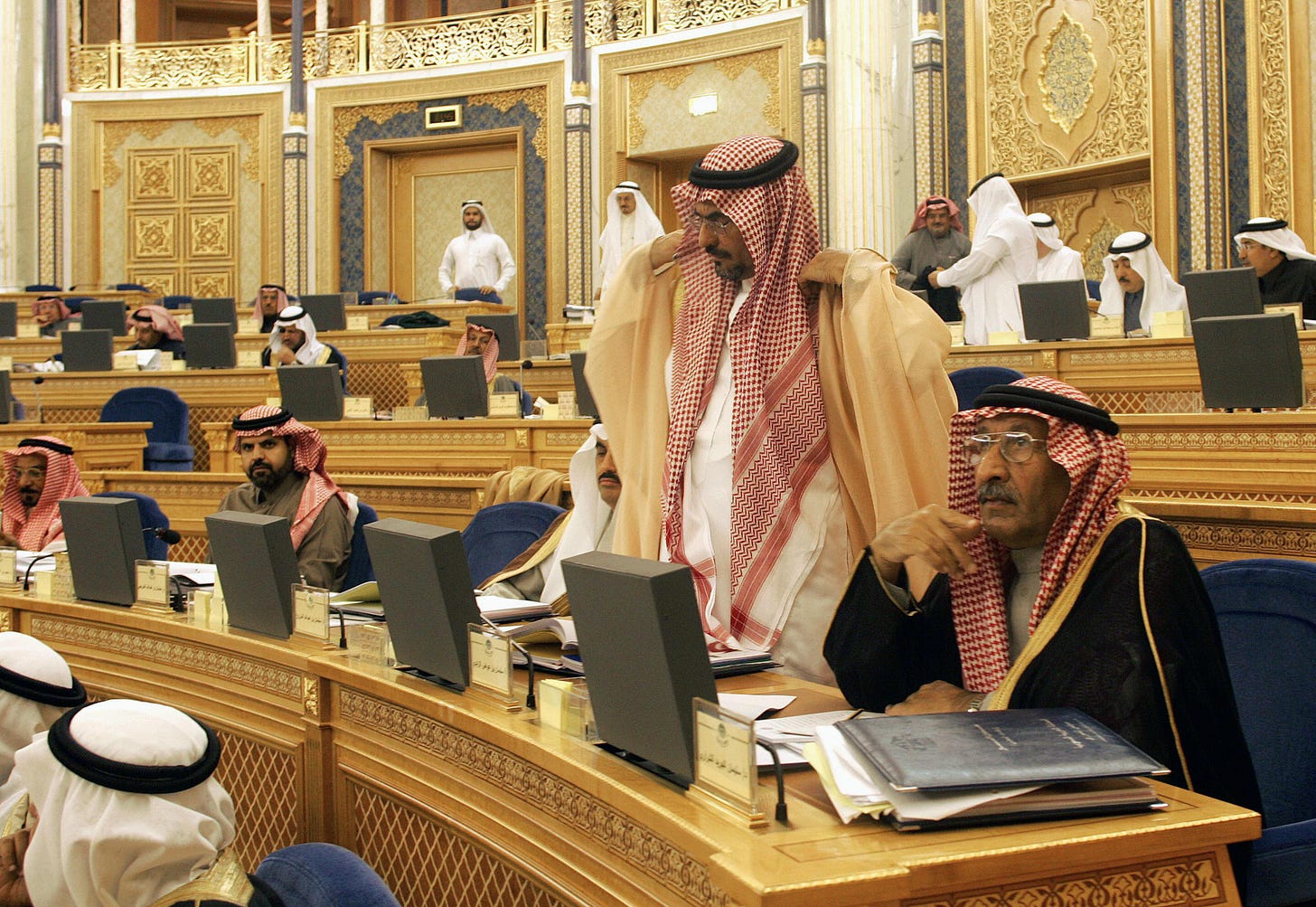Saudi Shura Council delays vote on prayer time closures
Issue returns to front after government restricted use of loudspeakers at mosques
Uncertainty continues to surround a policy that has long defined the rhythm of daily life in Saudi Arabia as the kingdom gradually embraces social liberalisation measures.
The policy of forcing shops to close during prayer times has been debated on and off over the past decade without reaching a resolution. Despite indications two years ago that the practice would be abandoned as part of the reforms pushed by Crown Prince Mohammed bin Salman to diversify the economy and open the country to investment and tourism, not much has changed since then.
The cabinet this month approved a plan to allow retail outlets to stay open 24 hours a day for a fee. Confusion over what that exactly meant dominated the hours after the cabinet meeting.
Al Arabiya said in a tweet that the decision included remaining open during prayers. But when a deputy minister was asked about it on air, he refused to answer. Pressed repeatedly by the anchor to clarify, the official kept saying: “this decision has nothing to do with opening or closing during prayer time.”
The channel deleted their tweet, but Okaz newspaper reported the next day that a decision to open businesses during prayer times was imminent, citing “trusted source.” Social media influencers linked to the government also appeared to hint at the same thing.
Well, it turns out the decision was not so imminent after all.
Okaz reported Sunday that the Shura Council was set to vote this week on a proposal that would ask the Ministry of Islamic Affairs not to force shops to close for prayers except for Friday noons. But the newspaper said the next day that the consultative council —whose members are appointed by the king and which serves as a quasi-parliament— has decided to postpone the vote “until further notice” just two hours before it was scheduled to take place on Monday.
No reason was given for postponing the vote on the proposal, which was introduced by four members, including prominent councilwoman Latifah al-Shaalan. These members argue that there is no evidence from the Quran or Sunnah to support the practice of closing shops for prayers (except on Friday), adding that such practice is rare and does not exist in any other Arab or Muslim country.
They explained there is no legal basis for this policy in Saudi law and pointed that it causes inconvenience to citizens and residents, particularly those who are ill or travelling. Restricting people to a specific practice where Islam has offered ample room to accommodate different situations leads to the obstruction of people’s interests, delays remedy for people in need and is unfair to traders and business owners, the members said, according to local media reports.
The members also sought to frame their proposal as being in line with the crown prince’s plans. “Vision 2030 includes a series of major economic initiatives and projects aimed at diversifying national revenue sources and achieving sustainable economic development, and this will not happen unless these initiatives and projects are supported by an empowering legislative and regulatory environment, which reduces the risk of doing business and makes the investment environment in the kingdom more attractive and competitive,” they said, adding that their proposal would promote tourism and improve Saudi Arabia’s image and position as a G20 country.
Columnist Humoud Abutalib wrote in Okaz that the unexpected delay of the vote amid heightened public interest in the issue will attract scrutiny:
Talking about this subject does not mean siding with those who would have voted for or against the proposal, but because postponing the presentation of the report linked to it in this sudden manner only two hours before the start of the session is bound to raise some questions, speculation, assumptions, interpretations and analyses that may be incorrect. Perhaps the sudden postponement was due to an urgent procedural reason or something like that but the council has to avoid such thing, particularly when it knows the public opinion is preoccupied with this issue and the news of the proposal has spread internally and externally.
Therefore, we hope that the council will transparently clarify what happened so that suspicions do not go too far.
The lack of clarity has meant that it was left to shop owners to interpret vague government policy on their own: some saw it as “a nod-and-a-wink approach to avert a conservative backlash”, while others decided to keep cautious until a formal decision is made. For example, some shops started to mark prayer times by dimming their lights and drawing down curtains on their fronts, but otherwise keeping doors open for customers who want to enter.
The return of the debate around prayer time closures follows a controversial decision by the government last month to restrict the use of external loudspeakers by mosques, a move that was criticised by some as the latest sign of the kingdom shedding yet another piece of its Islamic identity.
Despite the delay in the Shura Council vote and the muted protests, I fully expect that the practice of closing shops for prayer times would soon go away simply because this is where the country is headed, and that is plain for all to see.
A local news website used to mark prayer times by closing the site for 20 minutes, five times a day. When users visited the site during prayers, they were greeted with a “Closed for Prayer” message in Arabic along with a countdown to the end of the prayer break at the bottom of the page. One cleric in 2009 praised the bizarre move: “Closing a Saudi website for half an hour during obligatory prayers is a noble Islamic act,” he said. “It’s free from seeking fame or unacceptable religious intolerance, and it contributes to reviving the habit of individuals praying on time.”
This feels like a lifetime ago now.

